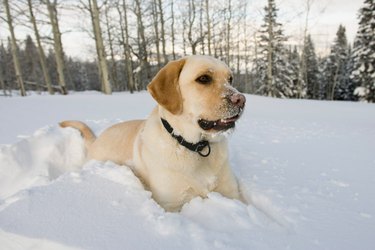Although some dog breeds shed more than others, all dogs shed to some extent. Shedding is the process of eliminating dead fur to allow a new coat to grow in. It's not only normal and natural but healthy. Shedding is influenced by seasonal changes, such as temperature and amount of daylight.

Video of the Day
Seasonal shedding is called "blowing coat." In heavier-coated dogs, such as huskies, Newfoundlands, and Great Pyrenees, shedding usually takes place twice a year, especially if they spend a lot of time outside. The bigger the dog, the more hair to fall out and the more noticeable the shed.
Video of the Day
Dogs shedding all year
Some dogs shed all year, especially those who spend a lot of time indoors. This is because their body acclimatizes to consistent temperatures. The environment indoors is actually an artificial climate, making it hard for their body to recognize seasonal shifts and natural cycles.
Therefore, each time an indoor dog steps outside, his body registers a change in temperature, throwing off his natural regulation and triggering him to shed a little. Clearly, this means most pet dogs shed a bit all year, so it's neither unusual nor unhealthy in small quantities.
Dog shedding in warm climates
As longer days and warmer months approach, dog shedding is expected because who doesn't want to abandon a winter coat in the summer? In the spring, most dog coats become lighter by shedding the thicker winter hair and replacing it with a thinner coat to help regulate body temperature in the heat of the summer.
During the spring, it's important to brush dogs several times a week or even daily. This will help loosen dead fur and control the amount that litters the floor. A brush with natural bristles is recommended. To remove the most fur, brush the coat first in the opposite direction of the hair growth to loosen it and then in the direction of hair growth to remove it. Repeat several times, especially when grooming double-coated dogs, such as collies, corgis, and Pomeranians.
Dog shedding in cold climates
Shedding doesn't occur naturally during cold temperatures, but it does occur naturally in preparation for winter. In late summer or early fall, many dogs experience a second annual shed. In this case, it's a change in daylight (or length of day) rather than a change in temperature that triggers shedding. This time, the dog releases her lighter coat.
In the fall, dogs are shedding their summer coat in preparation for growing a thicker, warmer coat, which is particularly necessary in snowy, cold climates. Double-coated dog breeds, such as huskies and malamutes, were originally bred to thrive outdoors in cold climates, so they will usually shed noticeably during the fall to winter transition. Seasonal shedding can take three to six weeks depending on the pet.
Shedding in various dog breeds
Breeds with double coats, such as Labrador retrievers, Newfoundlands, huskies, and Pekingese, tend to shed a lot or shed more visibly because they have both a soft undercoat and a coarser outer coat to release. Some double-coated dogs, like the golden retriever, have such a thick coat that they are likely to shed all year. Regular brushing will help the process, especially if you use an undercoat rake to pull out loose, soft fur.
Dog breeds such as the poodle, bichon frise, schnauzer, and Portuguese water dog are considered nonshedders but in fact shed significantly less because the hair follicles hang onto the hair longer than dogs who shed seasonally. However, this also allows the fur to grow longer, so these breeds need regular trimming to maintain a comfortable coat in any climate.